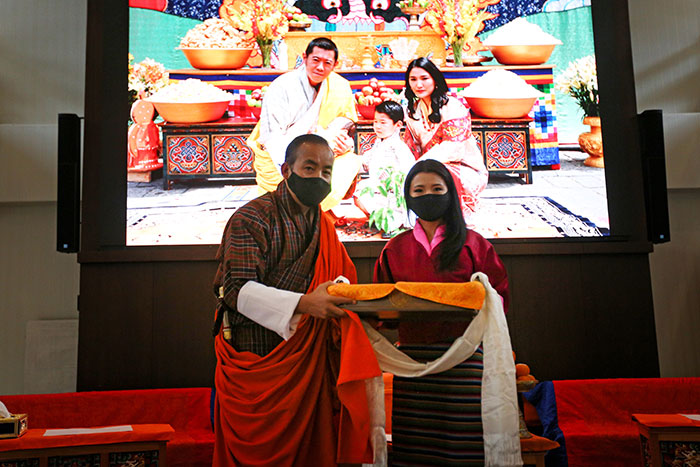
Her Royal Highness Princess Chimi Yangzom Wangchuck hands over the face masks to the education ministry
A Project HOPE initiative
Choki Wangmo
Upon Royal Command of His Majesty The King, Her Royal Highness Princess Chimi Yangzom Wangchuck formally granted more than 0.5 million 3-D face masks produced in Bhutan to the education ministry yesterday.
Supported by Project HOPE, Her Royal Highness spearheaded the production of the masks to be used in times of pandemic.
Education Minister JB Rai said that the ministry had safety concerns since not all the face masks were effective. “The ministry is facing fund shortage.”
Students and teachers will be given three reusable masks that can be used for a year.
Education Secretary Karma Tshering said that such initiatives enhanced the ministry’s effort to maintain safety protocols and ensured safe and continued education in schools. “The ministry will distribute the masks from today and will reach the schools across the country within a week.”
Face masks will also be provided to the support staff.
Director of Project HOPE, Pema Rinzing Rinchen, said that the choice of design and fabric and the production of the masks were personally guided by Her Royal Highness.
The face masks have three layers for maximum protection with a fine inner lining which is water-repellant. The design also allows for room to insert an additional filter.
“The masks come with a nose divider and adjustable ear loops to ensure that the masks are comfortable to wear even after long periods of time. A high-quality fabric with a thread count of more than 200 have been used,” the director said.
The customised masks are also of different sizes—small for minors, medium for classes 6-12, and large for class 12 students.
Since the first lockdown, the project has produced and distributed about 100,000 face masks which were provided to frontline workers with the first set of masks for use during the national day celebrations.
About 225 recipients of the Druk Gyalpo’s relief kidu in Thimphu and Paro were trained in tailoring for the project.
Spouses of the armed forces personnel, with previous training through project HOPE, were engaged to ramp up production of masks for the students and teachers.
Over 20 HOPE staff and pre-school teachers were engaged to man other components of the production process, such as mass-cutting, washing, drying, sanitising, packaging, and distribution of face masks.

